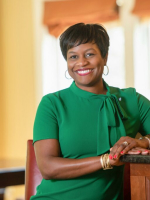"Wisdom is Wealth" – Swahii – African Proverb
02/06/2024 — In celebrating Black History Month, it’s important to recognize the sacrifices and contributions of those who paved the way for advancing equality. Following in the footsteps of those before us, there’s still more work to be done.
Building wealth among Black Americans will not only take time but also commitment from the community of Black investors and the financial professionals who serve them. There’s a lot of wisdom already accumulated among experienced Black investors that can help others take steps to build greater financial security.
This is especially important right now for those Black Americans who are nearing the traditional retirement age, between ages 60-65. This year, more Black Americans will turn 65 than at any point in history1. In the next few years, many will head into retirement feeling confident about their financial plans, but the realities of retirement (including higher expenses and savings shortfalls) could test their conviction.
To gauge how Americans in this age group are feeling about retirement, the Nationwide Retirement Institute® surveyed 1,000 adults between age 60-65 from different racial backgrounds, split evenly between those still working and those already retired. For Black Americans, the results of our survey offer insights to the experiences that have helped them build financial security as well as lessons in retirement planning for other Black investors to learn from.
I have my own lessons about saving and investing that I learned at an early age from my late father. “It is not what you make, it is what you keep!” is what he used to tell me. To demonstrate this, my father once gave me a $50 dollar bill, but not before writing down the serial number. He told me that if I kept that same bill, he would pay me interest on that $50 in six months and again in one year. It was a small action, but left an impression on me and helped shape my relationship with money and saving, which continues to this day.
By offering the same kind of lessons from Black investors who have successfully retired, you can bring focus to the unique challenges they face and help make their retirement dreams a reality.
What near-retirees can learn from those already retired
Black Americans who are in the later stages of their careers may be looking ahead to enjoying the retired life. But unfortunately, many will find that retirement isn’t what they expected it to be.
For one, many people have to retire earlier than they think. According to the NRI survey, while 67% of older workers (between ages 60-65) feel they are currently on track to retire, with an average expected retirement age of 67, a majority of retirees in this age group (64%) said they had to retire earlier than planned. The average retirement age among these retirees was 60.
And financially speaking, many near-retirees may discover they’re not as financially comfortable in retirement as they thought they’d be. While 78% of Black retirees age 60-65 said they’re at least somewhat financially comfortable, 22% said they’re not comfortable. Among Black Americans in this age group who are still working, a higher percentage (89%) believe they’ll be financially comfortable when they retire and fewer expect not to be financially comfortable in retirement.
What could explain this split between expectations and reality? It may be the higher costs of living in retirement. Many people think their spending will decrease in retirement, but that may not be the case for everyone. For example, older workers who aren’t yet retired expect to spend more of their retirement income (42%) on essentials like shelter and food, when in reality basic living expenses take up more than half (53%) of their budgets.
The time to close this gap in expectations and reality is during retirement planning, when clients have the ability to make adjustments. If the reality of retirement doesn’t meet client expectations, they may cope with unwelcome financial surprises or shortfalls in what their financial plan will provide during retirement. Clients are well-served when their financial plan is based on realistic expectations, not best-case scenarios or, worse, from uninformed guesses.
Passing along financial wisdom for younger generations
Of course, it’s not just those closest to retirement who are thinking about their financial futures. Workers of all ages are also planning, saving and investing for tomorrow. Our survey uncovered insights that are valuable for younger generations as well.
What lessons in retirement planning do older generations wish they had known earlier in life? According to our survey, 55% of older Black workers and retirees said to start saving early. This was also the top piece of advice for all survey respondents (63% overall.)
There were other lessons that these Black investors learned through experience but wished they had known earlier in life, including:
- Don’t live above your means (30%)
- Create a budget and stick to it (25%)
- Always max out retirement plan contributions (20%)
Additionally, 26% of Black survey respondents wished they would have taken the time in their younger years to learn more about retirement planning. This is a higher percentage than the 16% of survey respondents overall, and indicative of the need for Black investors (and the financial professionals they work with) to focus more on accumulating greater financial knowledge as key to accumulating greater future wealth.
Empower your Black clients to improve retirement readiness
You already see your role as a financial professional as valuable in helping clients develop a financial plan for retirement. Most people who work with financial professionals understand the value of the guidance you offer as well.
Our survey found that more than any other factor people rank working with a financial professional to make a retirement plan as a contributor to improving their retirement readiness; 86% of Black workers and retirees in the 60-65 age group said so. However, other factors such as automatically increasing and maxing out retirement plan contributions also ranked highly among Black survey respondents, 79% and 77% respectively.
In working with Black investors, a good amount of empathy for the unique financial challenges they face can go a long way toward building long-term relationships as clients. You can start by recognizing the obstacles that older Black investors have experienced and understanding the perspectives that shape their financial decisions.
Next, work with your Black clients to understand their individual needs for retirement planning, including how to optimize Social Security benefits and how to cover health care costs in retirement. Solving for these needs can become the foundation for a financial plan that can grow your clients’ confidence in their future. Use our Social Security and health care planning resources to help you personalize their plans.
Nationwide has partnered with leading financial services organizations, associations and historically Black colleges and universities to form Financial Alliance for Representation and Empowerment (FARE) to increase financial services innovation and growth through intentional, actionable, and measurable solutions. Financial Alliance for Representation and Empowerment (FARE)'s mission is to increase and drive inclusion within the financial services industry and communities that it serves.

